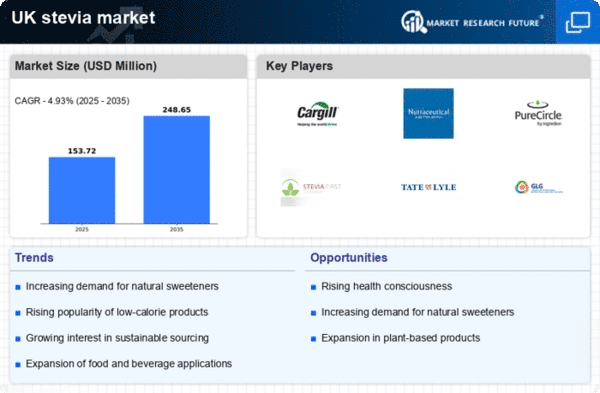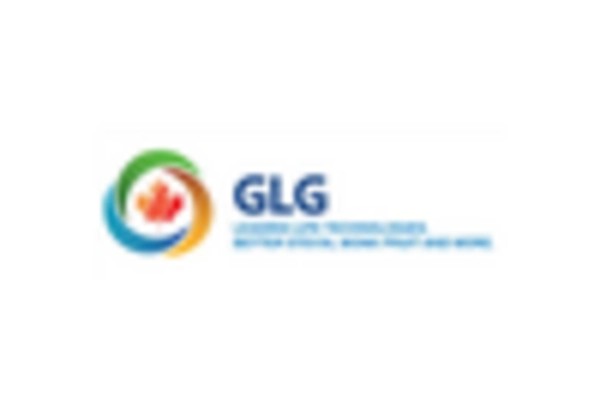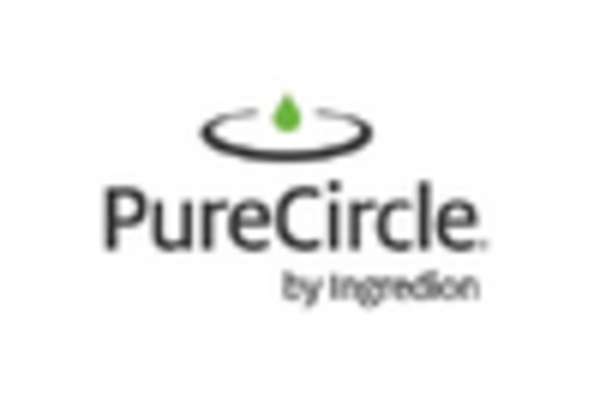Rising Demand for Natural Sweeteners
The increasing consumer preference for natural sweeteners is a pivotal driver in the stevia market. As health awareness escalates, individuals are gravitating towards products that offer lower caloric content and natural origins. In the UK, the demand for stevia has surged, with market reports indicating a growth rate of approximately 15% annually. This shift is largely attributed to the adverse health implications associated with artificial sweeteners, prompting consumers to seek alternatives. The stevia market is thus positioned to benefit from this trend, as more food and beverage manufacturers incorporate stevia into their formulations to cater to health-conscious consumers. This growing inclination towards natural ingredients is likely to sustain the momentum of the stevia market in the coming years.
Shift Towards Healthier Food Options
The ongoing shift towards healthier food options is a significant driver for the stevia market. UK consumers are increasingly prioritising health and wellness, leading to a marked decline in the consumption of sugar-laden products. This trend is reflected in the food industry, where manufacturers are reformulating products to reduce sugar content and replace it with healthier alternatives like stevia. Recent data suggests that the market for stevia in the UK is projected to reach £100 million by 2026, driven by this consumer demand for healthier choices. The stevia market is thus well-positioned to capitalize on this trend, as more consumers seek to reduce their sugar intake without compromising on taste.
Innovation in Food and Beverage Products
Innovation within the food and beverage sector is a driving force for the stevia market. As companies strive to meet evolving consumer preferences, there is a notable increase in the development of new products that incorporate stevia as a key ingredient. This trend is particularly evident in the beverage industry, where stevia is being used to create low-calorie soft drinks and health-oriented beverages. Recent reports indicate that the introduction of stevia-infused products has led to a 30% increase in sales for several brands. The stevia market is thus benefiting from this wave of innovation, as manufacturers explore diverse applications of stevia to attract health-conscious consumers and expand their market reach.
Increased Awareness of Diabetes Management
The rising awareness of diabetes management among UK consumers is a crucial driver for the stevia market. With diabetes prevalence on the rise, individuals are actively seeking low-glycemic alternatives to sugar. Stevia, known for its negligible effect on blood glucose levels, is becoming a preferred choice for those managing diabetes. This growing awareness is prompting food manufacturers to incorporate stevia into their products, catering to the needs of diabetic consumers. Market analysis indicates that the demand for stevia-based products is likely to grow by 25% over the next five years, as more consumers become informed about the benefits of using stevia in their diets. The stevia market is thus poised for substantial growth as it aligns with the health needs of this demographic.
Regulatory Support for Natural Ingredients
Regulatory frameworks in the UK are increasingly supportive of natural ingredients, which significantly impacts the stevia market. The Food Standards Agency (FSA) has established guidelines that facilitate the use of stevia in various food products, thereby enhancing its marketability. This regulatory backing not only assures consumers of the safety and efficacy of stevia but also encourages manufacturers to innovate and expand their product lines. As a result, the stevia market is experiencing a notable uptick in product launches, with an estimated 20% increase in new stevia-based products introduced in the last year alone. Such regulatory support is crucial for fostering consumer trust and driving the adoption of stevia as a preferred sweetening agent.
















